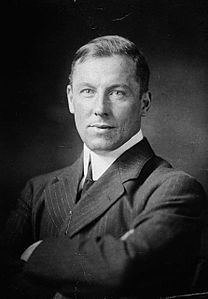Analysis of The March Of The Dead
The cruel war was over -- oh, the triumph was so sweet!
We watched the troops returning, through our tears;
There was triumph, triumph, triumph down the scarlet glittering street,
And you scarce could hear the music for the cheers.
And you scarce could see the house-tops for the flags that flew between;
The bells were pealing madly to the sky;
And everyone was shouting for the Soldiers of the Queen,
And the glory of an age was passing by.
And then there came a shadow, swift and sudden, dark and drear;
The bells were silent, not an echo stirred.
The flags were drooping sullenly, the men forgot to cheer;
We waited, and we never spoke a word.
The sky grew darker, darker, till from out the gloomy rack
There came a voice that checked the heart with dread:
"Tear down, tear down your bunting now, and hang up sable black;
They are coming -- it's the Army of the Dead."
They were coming, they were coming, gaunt and ghastly, sad and slow;
They were coming, all the crimson wrecks of pride;
With faces seared, and cheeks red smeared, and haunting eyes of woe,
And clotted holes the khaki couldn't hide.
Oh, the clammy brow of anguish! the livid, foam-flecked lips!
The reeling ranks of ruin swept along!
The limb that trailed, the hand that failed, the bloody finger tips!
And oh, the dreary rhythm of their song!
"They left us on the veldt-side, but we felt we couldn't stop
On this, our England's crowning festal day;
We're the men of Magersfontein, we're the men of Spion Kop,
Colenso -- we're the men who had to pay.
We're the men who paid the blood-price. Shall the grave be all our gain?
You owe us. Long and heavy is the score.
Then cheer us for our glory now, and cheer us for our pain,
And cheer us as ye never cheered before."
The folks were white and stricken, and each tongue seemed weighted with lead;
Each heart was clutched in hollow hand of ice;
And every eye was staring at the horror of the dead,
The pity of the men who paid the price.
They were come, were come to mock us, in the first flush of our peace;
Through writhing lips their teeth were all agleam;
They were coming in their thousands -- oh, would they never cease!
I closed my eyes, and then -- it was a dream.
There was triumph, triumph, triumph down the scarlet gleaming street;
The town was mad; a man was like a boy.
A thousand flags were flaming where the sky and city meet;
A thousand bells were thundering the joy.
There was music, mirth and sunshine; but some eyes shone with regret;
And while we stun with cheers our homing braves,
O God, in Thy great mercy, let us nevermore forget
The graves they left behind, the bitter graves.
| Scheme | AXAXBCBC DEDEFGFG HIHIJKJK LMLMNDND GOGOPQPQ ARARSTST |
|---|---|
| Poetic Form | |
| Metre | 01011101010111 11010101101 1110101010101001 01111010101 011110111011101 010110101 0101101010101 00101111101 0111011010101 0101011101 010101010111 1100110101 01110101110101 1101110111 11111101011101 11101010101 101010101010101 10101010111 11010111010111 0101010101 10101110010111 0101110101 01110111010101 0101010111 11110111111101 1110101011 10111101111 11011111 1011101110111101 1111010101 1111101010111101 0111110101 010101001111011 1111010111 010011101010101 0101011101 1010111100111101 1101110101 10100110111101 1111011101 111010101010101 0111011101 01010101010101 0101010001 11101011111101 01111110101 1101110111001 0111010101 |
| Closest metre | Iambic hexameter |
| Characters | 2,677 |
| Words | 490 |
| Sentences | 25 |
| Stanzas | 6 |
| Stanza Lengths | 8, 8, 8, 8, 8, 8 |
| Lines Amount | 48 |
| Letters per line (avg) | 42 |
| Words per line (avg) | 10 |
| Letters per stanza (avg) | 337 |
| Words per stanza (avg) | 81 |
Font size:
Submitted on May 13, 2011
Modified on March 16, 2023
- 2:28 min read
- 128 Views
Citation
Use the citation below to add this poem analysis to your bibliography:
Style:MLAChicagoAPA
"The March Of The Dead" Poetry.com. STANDS4 LLC, 2024. Web. 28 Apr. 2024. <https://www.poetry.com/poem-analysis/32590/the-march-of-the-dead>.


Discuss this Robert William Service poem analysis with the community:
Report Comment
We're doing our best to make sure our content is useful, accurate and safe.
If by any chance you spot an inappropriate comment while navigating through our website please use this form to let us know, and we'll take care of it shortly.
Attachment
You need to be logged in to favorite.
Log In